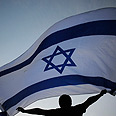
Prophets and protectors
Op-ed: Jewish ‘Peace Camp’ and ‘National Camp’ a reflection of centuries-old division among Jews
One variety focuses on Israel’s shortcomings, usually entailing mistreatment of one or another group – women, immigrant workers, Reform Jews, Conservative Jews, and, most prominently, Palestinians.
The other variety focuses on Israel’s moral virtues in the context of its struggle for peace and security.
This variety emphasizes Israel’s claims to democracy, progressive social values, industriousness, ingenuity, sensitivity and respect for human rights in the midst of a protracted, existential struggle. Often, in this discourse, Israel is compared to other Western democracies, the Palestinians, and the Arab or Muslim worlds.
Why do these two types of discourse - both conducted by Israelis, Zionists, pro-Israel Jews and their non-Jewish friends and allies – seem so dissonant, so disconcerting, and so mutually distasteful?
I’m reminded that I am not the first to take note of the disparate discourse on Israel. Almost 30 years ago, in September of 1982, during a temporary lull in the (first) War in Lebanon, and just before the massacres at Sabra and Shatila, Leonard (“Leibel”) Fein wrote these words in Moment:
There are two kinds of Jews in the world.
There is the kind of Jew who detests war and violence, who believes that fighting is not ‘the Jewish way;’ who willingly accepts that Jews have their own and higher standards of behavior. And not just that we have them, but that those standards are our lifeblood, and what we are about.
And there is the kind of Jew who thinks we have been passive long enough, who is convinced that it is time for us to strike back at our enemies, to reject once and for all the role of victim, who willingly accepts that Jews cannot afford to depend on favors, that we must be tough and strong.
And the trouble is, most of us are both kinds of Jew.
Although Leibel later partially re-thought or re-canted (having developed doubts that most of us had both sorts of Jews within us,) the distinctions are still resonant.
Thirty years later, these two kinds of Jews are alive and kicking, and they have been with us for some years, if not centuries. And the destiny of the Jewish nation has been at the heart of the contention between the two camps. One camp speaks with Judaism’s prophetic voice; the other primarily acts out of protective concerns. Both draw upon a wellspring of Jewish moral values and both see themselves defending the interests of Israel and the Jewish People.
‘Doves’ and ‘hawks’
The historic (if fanciful) images of Yochanan ben Zakkai and Simon bar Kokhba come to mind. Faced with the Roman oppressor, the former counseled surrender in 68 CE; 70 years later, the latter led a rebellion that was crushed. (Truth be told, history has judged some Jewish protectors far more kindly than bar Kokhba.)
Nearly two millennia later, Jewish prophets and Israel’s protectors emerge once again, loosely associated respectively with Labor Zionists and Revisionist Zionists. In the last generation, we saw them denoted as, “doves” and “hawks” or, more broadly as the “Peace Camp” and the “National Camp.”
And today? The pro-Israel world is still divided between a more prophetic and more protective camp. Among the former, loosely speaking, we have: the New Israel Fund, J Street, Jewish Democrats, and Israel educators who call for “hugging and wrestling” with Israel’s complexities. Among the latter: ZOA, AIPAC, Jewish Republicans, and the Israel advocacy industry who see advancing Israel’s cause in the public arena as a moral imperative.
The lines may be blurry, but the impulses are still present. The two camps feel thoroughly justified and deeply worried. And the more they raise their voices, the more the other side feels vulnerable, if not defeated. Protectors see prophets as doing grave harm to Israel’s image and security: Who needs Israel’s friends – let alone its enemies – reading stories alleging sexism, religious intolerance, human rights abuses, fascist tendencies and racist motives?
For their part, prophets see protectors undermining Israel’s security as well. They ask, how are Israelis ever to confront the hard and fateful decisions to make risky concessions for peace (or at least more security), if they are told that 1) all is right with them and their leaders, 2) that the world is uncaring to unsympathetic, and that 3) the other side is inherently hostile, untrustworthy and fanatical? And, in the interim, how does the protectors’ discourse reeking with self-righteousness motivate Israelis to avoid committing the most egregious abuses in several spheres – and in particular in conducting the occupation – abuses, that are wrong morally, and harmful politically?
Reconciling Prophets with protectors is not in the cards. But perhaps each can begin to see the value of the other – or even draw upon the sensitivities and worldviews that each bring to the pro-Israel discourse.
Steven M. Cohen is a Fellow of the Engaging Israel Project of the Shalom Hartman Institute and Director of the Berman Jewish Policy Archive @ NYU Wagner










